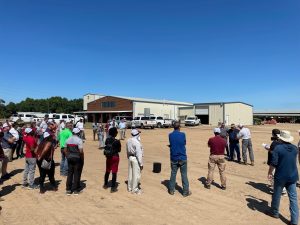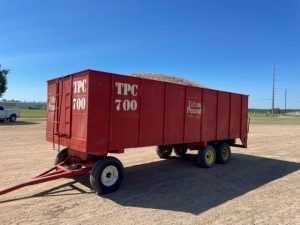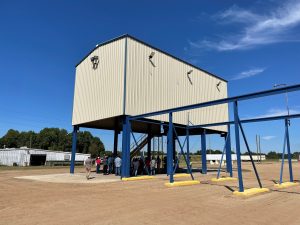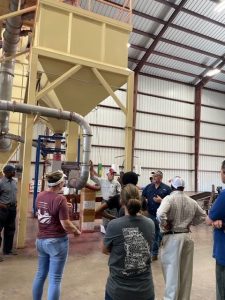After seeing how peanuts are harvested from the field, the Georgia Peanut Tour attendees stopped at Tifton Peanut Company to see what happens once the peanuts leave the farm. Tifton Peanut Company has six locations in Tifton and offers multiple services for the peanut farmer. They are a shelling plant, seed treatment facility, buying point and warehousing facility.
Peanuts arrive from the farm to Tifton Peanut Company via wagons or semi-trailers. If needed, the peanuts will go through a cleaner where dirt, rocks, sticks, etc. are removed. The moisture of the peanuts is then read and if needed, the peanuts may go into a dryer if moisture is above 10.5 percent. This threshold is determined by USDA; however, Tifton Peanut Company prefers to dry their peanuts to nine percent to prevent any storage issues throughout the year. A flexible duct extending from a fan is attached to the front or back of a semi-trailer or wagon, where air that is no more than 15 degrees Fahrenheit above ambient temperature and no higher than 95 degrees Fahrenheit is pushed through the peanuts to dry them.

Peanuts are dried if needed.
The trailers the peanuts arrive on are sent to a mechanical sampler, where wagons are probed eight times and a semi-trailer is probed 15 times. In semi trailers, this equates to roughly a 150-200 lb. peanut sample. From there, a 3,600 gram sample goes into a riffle divider that divides the sample in half. One half is an official grade sample that goes into the grading room and the other as a “just in case sample” to double-check accuracies of the grading or to use in case something happens with the initial grade sample.
Tifton Peanut Company offers green grading, also known as high moisture grading. This allows peanuts to be graded up to 18 percent moisture, which results in a deduction in grade and value and requires the load to go back on a dryer; however, the peanuts are not required to be re-graded. Check out the video below to see how the grading process works.
For seed treatment, peanut seed is shelled and stored in 2,200 lb. totes. A 5 lb. sample is retained out of that and sent off for germination where it has to germ to at least 75 before it can be put on the market. Tifton Peanut Company does not save anything unless it’s 85 or above. Once it has a germination, they will work through Georgia Crop Improvement to get tags for that lot. Each lot is 45,000 lbs. From there, the peanut seed goes through a shaker to eliminate any splits. It then receives a fungicide treatment. There are several different types of treatment available. Tifton Peanut Company uses a polymer treatment they feel better protects the peanut and allows them to color it for identification. After being treated, the peanuts go back in the 2,000 lb. tote bags or 50 lb. bags and return to storage until farmers are ready to purchase for planting season. Planting season for peanuts begins in the April/May timeframe each year. Good quality seed is critical for peanut farmers. And a 4 oz. seed treatment can be the determining factor on whether a crop is successful.




